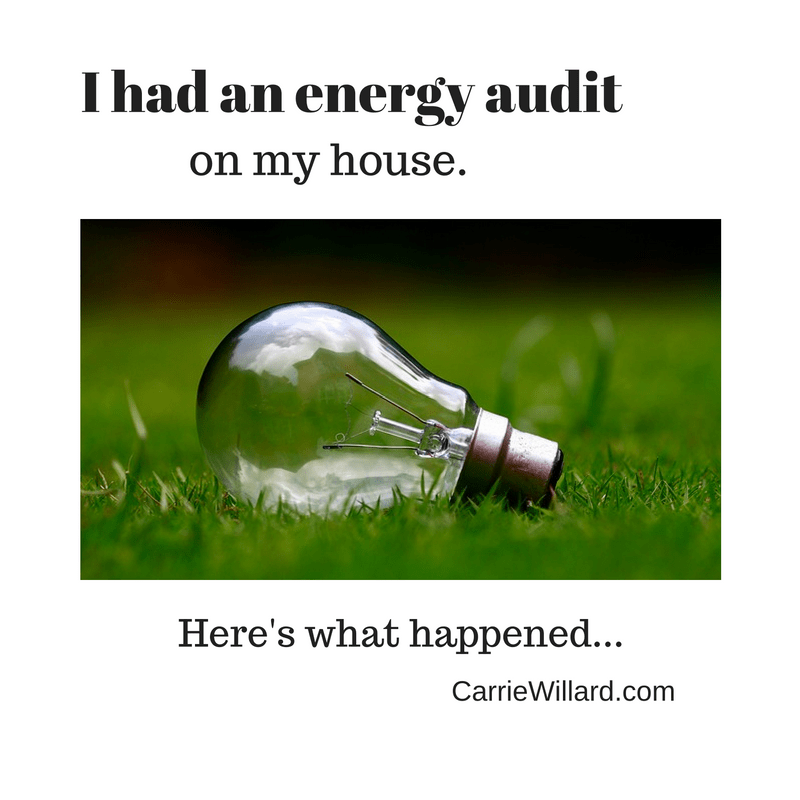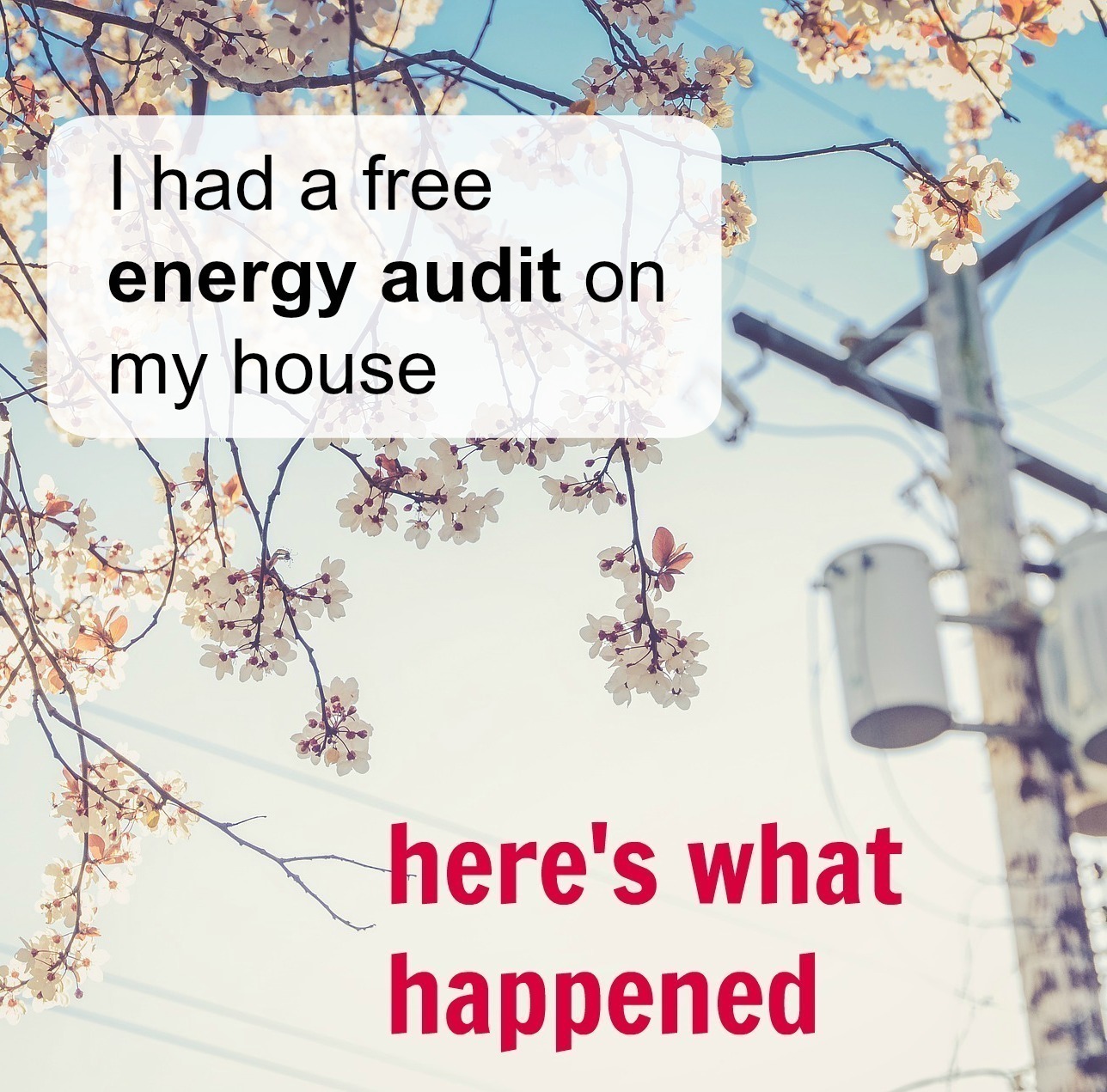When I found out that my electric company performs free energy audits, I asked for one immediately.
Even though we don’t own the house we’re currently living in (and therefore won’t be making any upgrades), I knew I could learn a lot of useful information about the house we’ll be buying in a few months, and perhaps a few tips to help me save money this winter on my utilities.
I have been poring over articles on the internet about saving money on utilities, but sometimes it’s hard to grasp all the information. Being able to ask a real live expert questions and get them answered immediately is invaluable.
And did I mention this service is free? I’m betting your utility company offers this too.
Our house energy audit
Yesterday the friendly gentleman (henceforth referred to as Mr. Audit) knocked on my door with a clipboard in hand and the first thing he asked to see was my attic.
The Attic
Which, as it turns out, doesn’t have nearly enough insulation. Georgia winters are mild, it’s our summers that break the bank, and the attic is HOT. Because it isn’t insulated well, it’s pushing super-heated air into the upstairs bedrooms. Even with heavy curtains on those windows, the bedrooms are sweltering all summer. Now I know why!
Our attic insulation was bare in some areas, and only half as thick as it should be in others.
In addition, the attic access (in my case, it’s a folding stair/pull-down door combo) itself needs to be insulated with weatherstripping and a “box” of insulation attached to the attic side.
The HVAC
Then we looked at the furnace. Mr. Audit suggested I seal (with something called mastic) any open areas that were allowing air to leak out, making the unit less efficient.
Next, we stepped outside to look at the HVAC unit. Uh-oh. It was surrounded by overgrown weeds and grass, a big no-no! He said it should be bare 18″ all around. That’s something we can easily fix in a rental, it just requires pulling out the weed whacker. Which just happens to be broken. Argh! Oh, well, maybe we can use the lawnmower for this.
Incidentally, our A/C stopped working two summers ago and when we called out a repairman (yikes – we called a repairman for such an easy fix!), he said the unit was clogged with dryer lint that was venting outside, inches away from the unit.
What dumbo designed things that way? Even I, a non-handy lady type person, could tell you that was stupid!
Note to self: take broom outside and knock the dryer lint off the unit.
Back inside to the furnace. I admitted, head hanging in shame, that I did not know where the filter was located, and therefore had not changed it since we moved into our house over 2 years ago.
So embarrassing! This adulting is so hard. One has to remember all.the.things. Why aren’t instruction booklets handed out, along with high school diplomas, that tell you, “remember to change your furnace filter”?!
I felt a little bit better when he had trouble locating it. We’re pretty sure it’s behind a metal panel on the furnace, but Mr. Audit wouldn’t remove it to check because legal stuff. So that’s on my to-do list for today.
How often to change the filter depends on the model, there is no set recommendation. Change it or clean it when it’s dirty and you can’t see through it. (Note: vacuuming a disposable filter is an iffy frugal practice, as it can damage it and doesn’t really clean the inner fibers fully.)
The Kitchen
We stepped into the kitchen, where he recommended pulling out the fridge and vacuuming the coils every few months. This was his only recommendation. I was surprised he didn’t mention a device like the Kill-A-Watt? These measure how much energy various appliances are using. After learning this information, you can adjust your usage accordingly. One thing I’ve learned is to use the oven as little as possible, and when I do, to fill it up with several items. See this post with frugal kitchen tips.
The Living Room
We have a fireplace, which we never use, and the damper is closed, but nonetheless it leaks freezing cold air into the living room all winter. Mr. Energy Audit told me there is such a thing as a “chimney balloon” one can purchase. It blows up and fills the space, preventing outside air from coming in. Neat!
Not everything was bad news about the energy audit. We’re doing some things already to save on energy costs.
Turns out we did have weatherstripping on our doors (I didn’t even know what it WAS and had to have it pointed out to me.), but it needs replacing soon, and some outside areas need caulking.
We also have double-paned windows, something I also didn’t know.
My hot water heater is set at 120F, which is best.
We also had blocking around recessed lighting, and our outlets have insulating foam behind them.
I set the thermostat at 81F all summer (our electric bill was slashed in half as a result), and I’ll set it at 68 this winter.
Also, since our house doesn’t have a basement or crawl space, we don’t have to worry about insulation under the house.
So, based on what I learned from the audit, here are my to-dos and recommendations for saving money on energy costs.
This will be my punch list once we move into our new house.
1- Make sure the attic is insulated properly. How thick the insulation should be depends on your region, but you can find out this information from your utility company.
2- Insulate the attic door. Here are some easy instructions. I’m not very handy, but I think I could handle this project.
3- Seal furnace gaps and change or clean air filters regularly! As it turns out, my furnace looks like the one in this video, so now I feel dumb for not googling it earlier. Whether to clean or replace depends on what type of filter you have.
4- Trim anything growing around your HVAC unit outside. It needs 18″ of space around it to work efficiently.
5- Vacuum fridge coils a couple times a year. (It’s a good practice to move the fridge away from the wall and clean behind/under there anyway, to avoid bug infestations. This also helps prolong the life of the fridge.)
6- Make sure there is insulation around lighting and outlets. Caulk and weatherstrip doors and cracks in window frames and around doors.
I asked Mr. Audit about solar panels and how to find a reputable company to install them. He said they had recommendations on the utility company’s website. (Sounds easy enough!) Then he said that in order to get the fastest ROI, we should go with a solar powered hot water heater. Good to know!
Finally, Mr. Audit said that it’s not a good idea to replace existing appliances (whether fridges, HVAC units, etc) with more energy-efficient models. It’s best from an economical and environmental standpoint to use the existing stuff until it reaches the end of its lifespan, THEN replace with Energy Star stuff.
Have you ever asked for an energy audit on your home? What did you learn? And if you haven’t, why not? Did I mention it’s free?! Your utility company wants you to send them less money each month and they make it easy for you to do so.
This article isn’t comprehensive because every house, climate, situation is different. So go ahead and click over to your utility company’s website and ask for your very own handy-dandy audit. Even if you’re a renter like myself, there are inexpensive fixes that can save you money every single month on your bills.




Since I’m in the process of updating the exterior, electrical, and plumbing in my home, I had one of these done. I also had a water conservation audit done by the water department – another great free audit. Some utility companies even offer rebates for certain upgrades and updates. Just by installing 1 new toilet and providing receipts to the water company, I didn’t have a water bill for 6 months.
Now I know exactly what kind of insulation, fixtures, wiring etc to purchase or have the contractors estimate in their bids. Free ways to know where the biggest savings can come from. I do wish I’d known about solar powered water heaters when I replaced mine 5 years ago. But you can bet when it stops working this next time, I’m going solar.
@LaShae: “I also had a water conservation audit done by the water department – another great free audit.” – Great tip! I’ll look into this once we move. Our water bill is horribly high where we live, and talking with neighbors, it seems everyone around here has high bills. It’s double what it was in our previous home. (Same county, different town.)